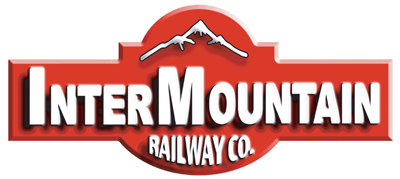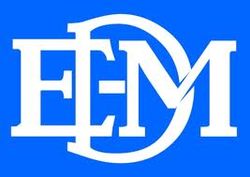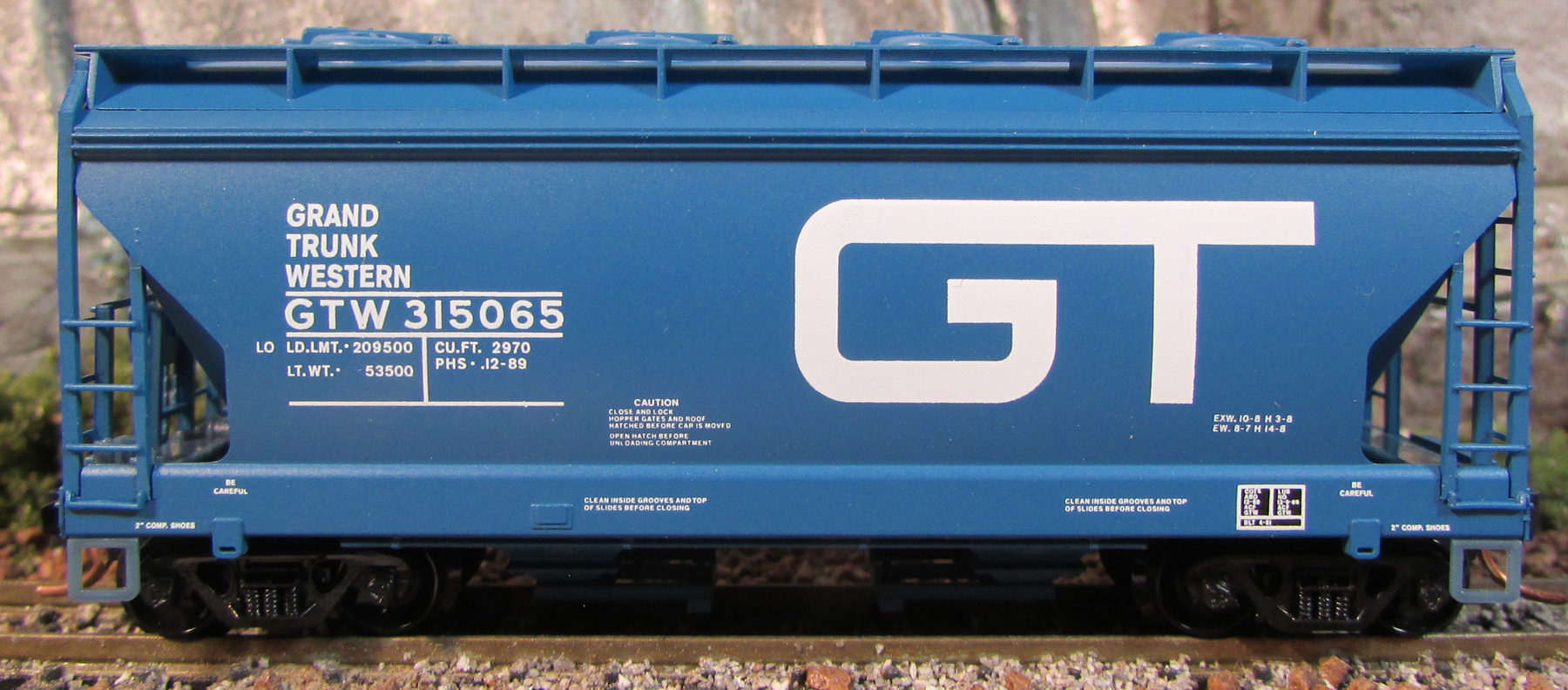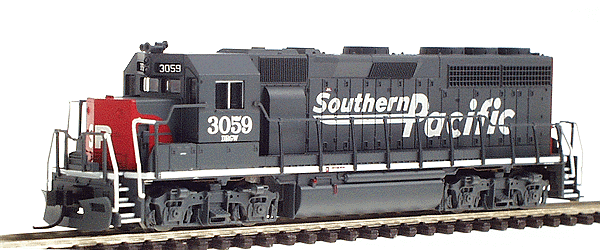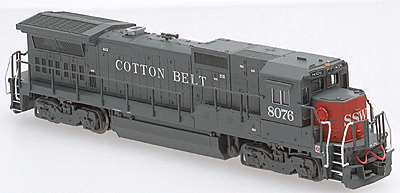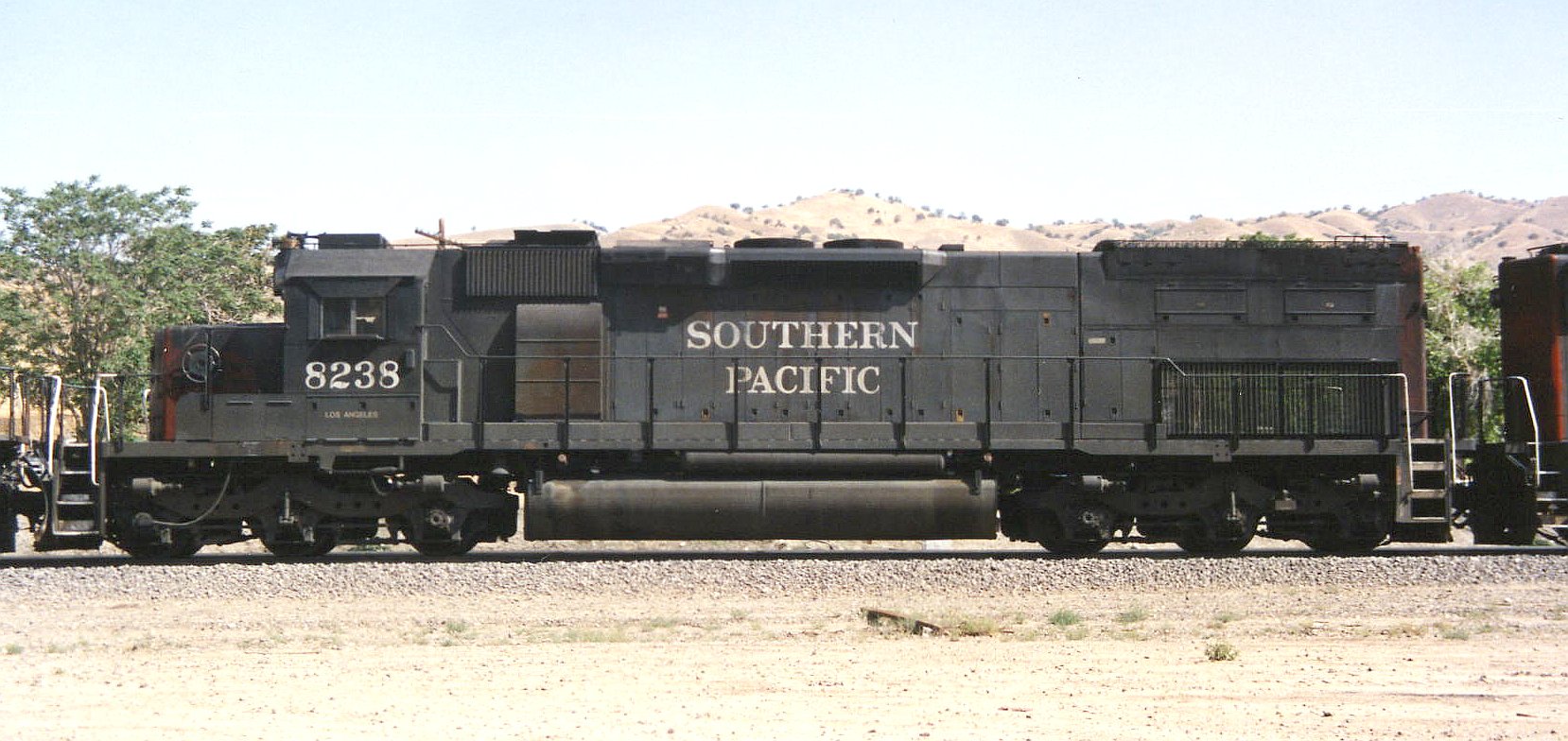Model Information: InterMountain first introduced this model in 2005, and has produced several additional runs since then. The design of the chassis is very much similar to the Atlas SD50/60 mechanism. It sports all the features one normally associates with "modern" diesel models - IE, DCC-Ready / split-frame / all-metal chassis, 5-pole / skew-wound / "slow speed" motor, dual flywheels, low-friction drive, bi-directional LED lighting, all-wheel drive and pickup (no traction tires), blackened / low-profile wheels, shell-mounted magnetic knuckle couplers, all-plastic gearing, etc.
Assembly instructions from Intermountain: SD40T-2 / SD45T-2 (or on company website)
Note on this drawing that several parts are actually Atlas parts.
Assembly instructions from Intermountain: SD40T-2 / SD45T-2 (or on company website)
Note on this drawing that several parts are actually Atlas parts.
DCC Information: Models produced up to 2010 accept the following plug-in decoders (non-sound):
- Digitrax DN166I0: 1.5 Amp Decoder for Intermountain N scale SD40T-2 / SD45T-2.
- TCS IMD4: BEMF decoder designed to fit Intermountain N scale SD40T-2, SD45T-2, SD45-2.
- NCE N12AOe: Plug and Play, 2 function decoder for Intermountain Tunnel Motors.
- Digitrax DN166I0: 1.5 Amp Decoder for Intermountain N scale SD40T-2 / SD45T-2.
- TCS IMD4: BEMF decoder designed to fit Intermountain N scale SD40T-2, SD45T-2, SD45-2.
- NCE N12AOe: Plug and Play, 2 function decoder for Intermountain Tunnel Motors.
Prototype History: An SD40T-2 is a 6-axle diesel-electric locomotive built by General Motors Electro-Motive Division having a 16-cylinder EMD 645E3 diesel engine producing 3,000 horsepower (2,240 kW). 312 SD40T-2s were built for North American railroads between April 1974 and July 1980. This locomotive and the SD45T-2 are popularly called tunnel motors, but EMD's term is SD40-2s with "cooling system modifications" because they were designed for better engine cooling in tunnels. The difference between this locomotive and its non-tunnel motor cousin, the SD40-2, are the radiator intakes and radiator fan grills located at the rear of the locomotive. The radiator air intakes in this model were along the deck to allow more fresh, cooler air to enter and less hot exhaust fumes lingering around the tunnel's ceiling.
EMD SD45T-2 vs SD40T-2 radiator fan motor access doors
This locomotive model was purchased by the Denver and Rio Grande Western Railroad, the Southern Pacific Railroad, and its subsidiary Cotton Belt. Southern Pacific's version has a 4,400-US-gallon (16,700 L; 3,660 imp gal) fuel tank and is 70 feet 8 inches (21.54 m) long. Rio Grande's version has a smaller 4,000-US-gallon (15,100 l; 3,330 imp gal) fuel tank. After merging with Rio Grande, the Southern Pacific and later Union Pacific owned every SD40T-2.
In 2005, most of these units were owned by Union Pacific or leasing companies. By 2008, none were left in service on UP with SP or DRGW reporting marks. DRGW 5371 was the last one, retired in March 2008, and now resides at the Utah State Railroad Museum in Ogden Utah. Another SD40T-2 is preserved at the Boone & Scenic Valley Railroad in Boone, Iowa. UP still runs a few units repainted in its own livery.
Full EMD SD40T-2 data sheet on The Diesel Workshop.
Read more on Wikipedia.
Read more on American-Rails.com
This locomotive model was purchased by the Denver and Rio Grande Western Railroad, the Southern Pacific Railroad, and its subsidiary Cotton Belt. Southern Pacific's version has a 4,400-US-gallon (16,700 L; 3,660 imp gal) fuel tank and is 70 feet 8 inches (21.54 m) long. Rio Grande's version has a smaller 4,000-US-gallon (15,100 l; 3,330 imp gal) fuel tank. After merging with Rio Grande, the Southern Pacific and later Union Pacific owned every SD40T-2.
In 2005, most of these units were owned by Union Pacific or leasing companies. By 2008, none were left in service on UP with SP or DRGW reporting marks. DRGW 5371 was the last one, retired in March 2008, and now resides at the Utah State Railroad Museum in Ogden Utah. Another SD40T-2 is preserved at the Boone & Scenic Valley Railroad in Boone, Iowa. UP still runs a few units repainted in its own livery.
Full EMD SD40T-2 data sheet on The Diesel Workshop.
Read more on Wikipedia.
Read more on American-Rails.com
Road Name History: 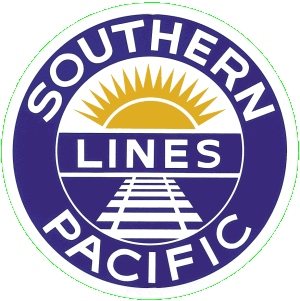 The Southern Pacific Transportation Company (reporting mark SP), earlier Southern Pacific Railroad and Southern Pacific Company, and usually called the Southern Pacific or (from the railroad's initials) Espee, was an American Class I railroad. It was absorbed in 1988 by the company that controlled the Denver and Rio Grande Western Railroad and eight years later became part of the Union Pacific Railroad.
The Southern Pacific Transportation Company (reporting mark SP), earlier Southern Pacific Railroad and Southern Pacific Company, and usually called the Southern Pacific or (from the railroad's initials) Espee, was an American Class I railroad. It was absorbed in 1988 by the company that controlled the Denver and Rio Grande Western Railroad and eight years later became part of the Union Pacific Railroad.
The railroad was founded as a land holding company in 1865, later acquiring the Central Pacific Railroad by lease. By 1900 the Southern Pacific Company was a major railroad system incorporating many smaller companies, such as the Texas and New Orleans Railroad and Morgan's Louisiana and Texas Railroad. It extended from New Orleans through Texas to El Paso, across New Mexico and through Tucson, to Los Angeles, through most of California, including San Francisco and Sacramento. Central Pacific lines extended east across Nevada to Ogden, Utah, and reached north through Oregon to Portland. Other subsidiaries eventually included the St. Louis Southwestern Railway (Cotton Belt), the Northwestern Pacific Railroad at 328 miles (528 km), the 1,331 miles (2,142 km) Southern Pacific Railroad of Mexico, and a variety of 3 ft (914 mm) narrow gauge routes.
In 1929 SP/T&NO operated 13848 route-miles not including Cotton Belt, whose purchase of the Golden State Route circa 1980 nearly doubled its size to 3,085 miles (4,965 km), bringing total SP/SSW mileage to around 13,508 miles (21,739 km).
By the 1980s route mileage had dropped to 10,423 miles (16,774 km), mainly due to the pruning of branch lines. In 1988 the Southern Pacific was taken over by D&RGW parent Rio Grande Industries. The combined railroad kept the Southern Pacific name due to its brand recognition in the railroad industry and with customers of both constituent railroads. Along with the addition of the SPCSL Corporation route from Chicago to St. Louis, the total length of the D&RGW/SP/SSW system was 15,959 miles (25,684 km).
By 1996 years of financial problems had dropped SP's mileage to 13,715 miles (22,072 km), and it was taken over by the Union Pacific Railroad.
Read more on Wikipedia.

The railroad was founded as a land holding company in 1865, later acquiring the Central Pacific Railroad by lease. By 1900 the Southern Pacific Company was a major railroad system incorporating many smaller companies, such as the Texas and New Orleans Railroad and Morgan's Louisiana and Texas Railroad. It extended from New Orleans through Texas to El Paso, across New Mexico and through Tucson, to Los Angeles, through most of California, including San Francisco and Sacramento. Central Pacific lines extended east across Nevada to Ogden, Utah, and reached north through Oregon to Portland. Other subsidiaries eventually included the St. Louis Southwestern Railway (Cotton Belt), the Northwestern Pacific Railroad at 328 miles (528 km), the 1,331 miles (2,142 km) Southern Pacific Railroad of Mexico, and a variety of 3 ft (914 mm) narrow gauge routes.
In 1929 SP/T&NO operated 13848 route-miles not including Cotton Belt, whose purchase of the Golden State Route circa 1980 nearly doubled its size to 3,085 miles (4,965 km), bringing total SP/SSW mileage to around 13,508 miles (21,739 km).
By the 1980s route mileage had dropped to 10,423 miles (16,774 km), mainly due to the pruning of branch lines. In 1988 the Southern Pacific was taken over by D&RGW parent Rio Grande Industries. The combined railroad kept the Southern Pacific name due to its brand recognition in the railroad industry and with customers of both constituent railroads. Along with the addition of the SPCSL Corporation route from Chicago to St. Louis, the total length of the D&RGW/SP/SSW system was 15,959 miles (25,684 km).
By 1996 years of financial problems had dropped SP's mileage to 13,715 miles (22,072 km), and it was taken over by the Union Pacific Railroad.
Read more on Wikipedia.
Brand/Importer Information: InterMountain was founded in 1985 by Fred Brummet. They got started in the model railroad business by producing O-Scale model kits. They got started in the N Scale business almost a decade later when in 1994 they introduced the 40-23 reefer car in kit form. Later, in 1998, they started producing RTR (Ready-to-Run) models. By the early 2000s, InterMountain phased out kit production in favor of the RTR models.
The InterMountain Railway company is located at 1224 Boston Ave in Longmont, CO. They are a manufacturer of HO, N and Z scale model trains. They have produced kits as well as RTR (Ready-To-Run) models. Their N Scale products include locomotives as well as rolling stock. Their rolling stock lineup includes Boxcars, Hoppers, Tank Cars, Reefers, Gondolas, Stock Cars and Flatcars.
Their locomotive releases have primarily been diesel units, with the one major exception being their series of AC-12 Cab Forward steam locos. Their diesel lineup includes F3's, F7's, F9's, SD40's, SD45's and FT units. They are known for quality and detail. They also release their rolling stock in larger varieties of road numbers than most of the other manufacturers.
The InterMountain Railway company is located at 1224 Boston Ave in Longmont, CO. They are a manufacturer of HO, N and Z scale model trains. They have produced kits as well as RTR (Ready-To-Run) models. Their N Scale products include locomotives as well as rolling stock. Their rolling stock lineup includes Boxcars, Hoppers, Tank Cars, Reefers, Gondolas, Stock Cars and Flatcars.
Their locomotive releases have primarily been diesel units, with the one major exception being their series of AC-12 Cab Forward steam locos. Their diesel lineup includes F3's, F7's, F9's, SD40's, SD45's and FT units. They are known for quality and detail. They also release their rolling stock in larger varieties of road numbers than most of the other manufacturers.
Item created by: Alain LM on 2016-12-31 13:32:44. Last edited by Lethe on 2020-06-02 00:00:00
If you see errors or missing data in this entry, please feel free to log in and edit it. Anyone with a Gmail account can log in instantly.
If you see errors or missing data in this entry, please feel free to log in and edit it. Anyone with a Gmail account can log in instantly.



